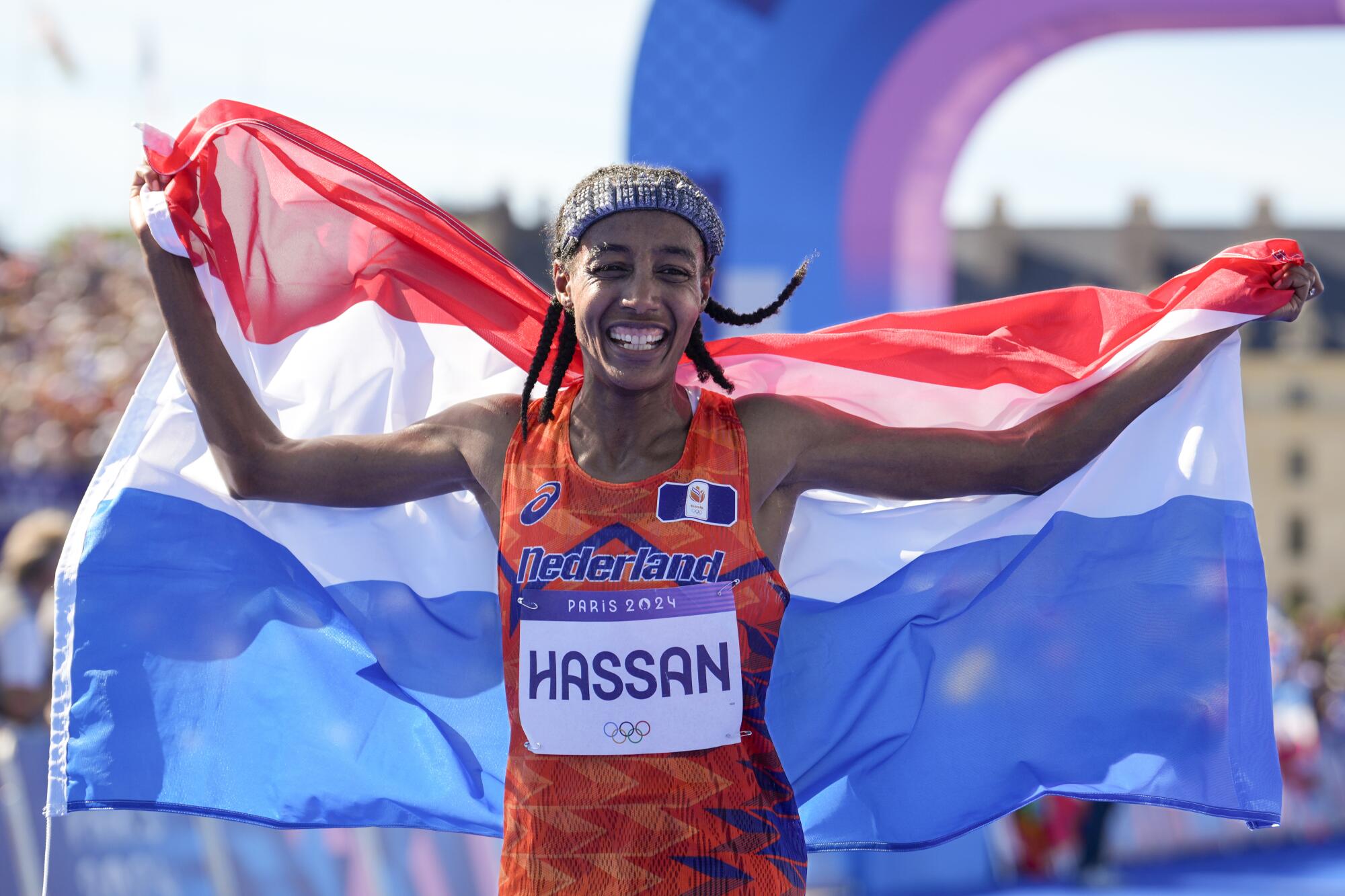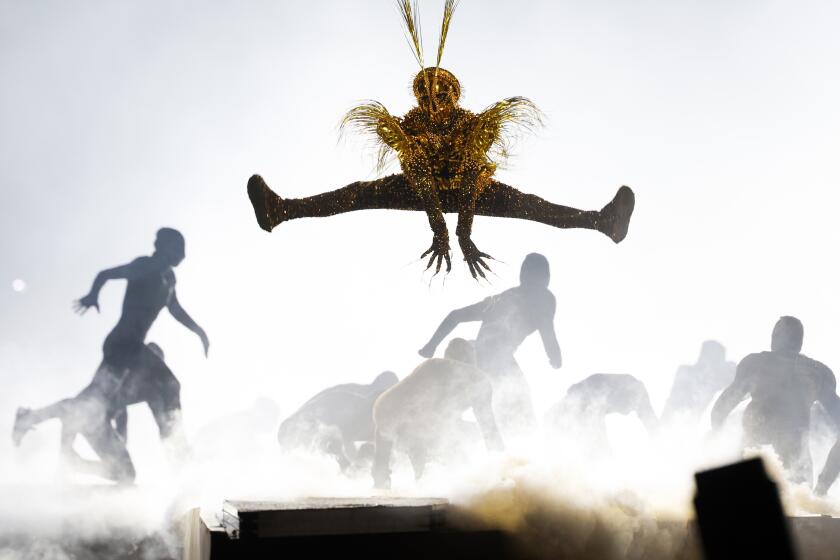
- Share via
PARIS — The original Olympic motto translates from Latin as “swifter, higher, stronger.” And those who live up to it are the ones who win gold medals and climb to the top step of the podium.
But what about those who go slower, lower and are weaker? Pierre de Coubertin, founder of the modern Olympics, had them covered too.
“The most important thing in the Olympic Games is not to win,” he said, “but to take part.”
Kinzang Lhamo, a 26-year-old in the Royal Bhutan Army and the only woman on her country’s three-person Olympic team, is one of those who didn’t win but simply took part in the Paris Olympics, finishing last in the women’s marathon Sunday, the final day of the Games.
Sifan Hassan, an Ethiopian who runs for the Netherlands, won the race in 2 hours, 22 minutes and 55 seconds, breaking the Olympic record and completing a difficult triple that saw her run 62 kilometers in Paris, winning bronze medals on the track in the 5,000 and 10,000 meters in addition to her marathon gold. Shortly after crossing the line, she wrapped the Dutch flag around her head and wept with joy.

Lhamo needed another hour and a half to finish, crossing the line in 3:52:59. She didn’t see the leaders after she left the starting line and finished nearly an hour behind the next-closest runner.
But simply finishing made her a winner in a race that had nearly as much symbolism as it did competitors.
Photos of the closing ceremony at the 2024 Paris Summer Olympics, which hands off the baton to Los Angeles.
Traditionally the men’s marathon is the final track and field event of the Summer Games but this year, when the number of participating athletes was equal between men and women for the first time, the women went last. The switch was significant because women were banned from running the Olympic marathon until 1984; the distance, it was believed, was too taxing for them.
In Paris the women not only ran, they were given a place of honor, running through enthusiastic crowds that lined the entire route and finishing before massive grandstands filled with thousands more. In another historic nod, Kathrine Switzer, the first woman to run the Boston Marathon, was on hand to get things started by delivering the “coup de baton,” a French cultural tradition that involved tapping a wooden baton on the floor to indicate a show is about to start.
The Hôtel de Ville hosted the start of the men’s and women’s marathons in Paris.
The 26.2-mile course to Versailles and back was symbolic as well, retracing part of the 1789 women’s march on the royal gardens, a key moment from the French Revolution in which thousands of market women, shopkeepers and laborers gathered at the Hôtel de Ville, Paris’ city hall, to demand bread and arms, then marched to Versailles to bring Louis XVI back to the capital. That day the king also bowed to demands that he ratify the Declaration of the Rights of Man and of the Citizen, which became the preamble to the first written constitution of France in 1791.
Unfortunately for the runners, the revolutionaries marched up and down some steep hills. So the marathon course, which started at the seven-century-old Hôtel de Ville, near the Notre Dame cathedral, and passed the Palais Garnier opera house, the Louvre and the Eiffel Tower on its way to the finish line at the Esplanade des Invalides, was one of the most challenging in Olympic history.
And if Lhamo didn’t exactly conquer it, she at least survived it.
In distance running DNF means “did not finish”; 11 of the 91 starters, including Fiona O’Keefe, winner of the U.S. trials in February, took that option Sunday. Lhamo was a DNQ — did not quit.
If the most important thing in the Olympic Games is to take part, the second most important is to finish. And she did.
It wasn’t easy. Lhamo was competing with a “universality place,” a spot on the starting line reserved for athletes from underrepresented national Olympic committees. And Bhutan certainly qualifies. The Southeast Asian country of fewer than 1 million people has never won an Olympic medal.
Lhamo began running after joining the army, then became an ultramarathoner, competing in a five-day event that treks up mountain passes as high as 18,000 feet.
Her best marathon time, however, is 3 hours, 26 minutes, so she quickly lost touch with the rest the field, falling more than 4½ minutes behind the next-slowest runner by five kilometers. But she never had to run alone.
The spectators lining the course cheered her, some waving the orange-and-yellow Bhutanese flag with the dragon in the center, the one Lhamo carried in the opening ceremony two weeks ago.
She walked most of the final two kilometers, with dozens of people on either side of the barricades that lined the course walking alongside her, offering encouragement and simply company. The procession soon became a parade as a man on a bike attempted to pace her while others reached over the barriers to urge her on.
Luanne Park, 63, was among the competitors who embraced excruciating pain in a battle to traverse a 100-mile course unlike any other in the U.S.
In the huge grandstands lining the blue carpet covering the final 100 meters of the finish at the Invalides, a military complex dating to the 15th century reign of Louis XIV, thousands waited for the medal ceremony, which was delayed by the building human drama of Lhamo’s race. Fans followed her on scoreboard-sized video monitors and just before she came into view from the stands, Lhamo, her face furrowed in concentration if not pain, began running again — slowly, tentatively — and when she entered the final stretch, the crowd stood and applauded.
After crossing the line Lhamo made her way to a plastic folding chair as a volunteer placed a wet towel on her shoulders. She would need medical attention, her coach said.
“Cramps,” he added.
But the cramps weren’t expected to keep her from carrying her country’s flag again in the closing ceremony. Because as Lhamo’s marathon performance proved, the Olympics aren’t about winning, they’re about taking part.
More to Read
Go beyond the scoreboard
Get the latest on L.A.'s teams in the daily Sports Report newsletter.
You may occasionally receive promotional content from the Los Angeles Times.









